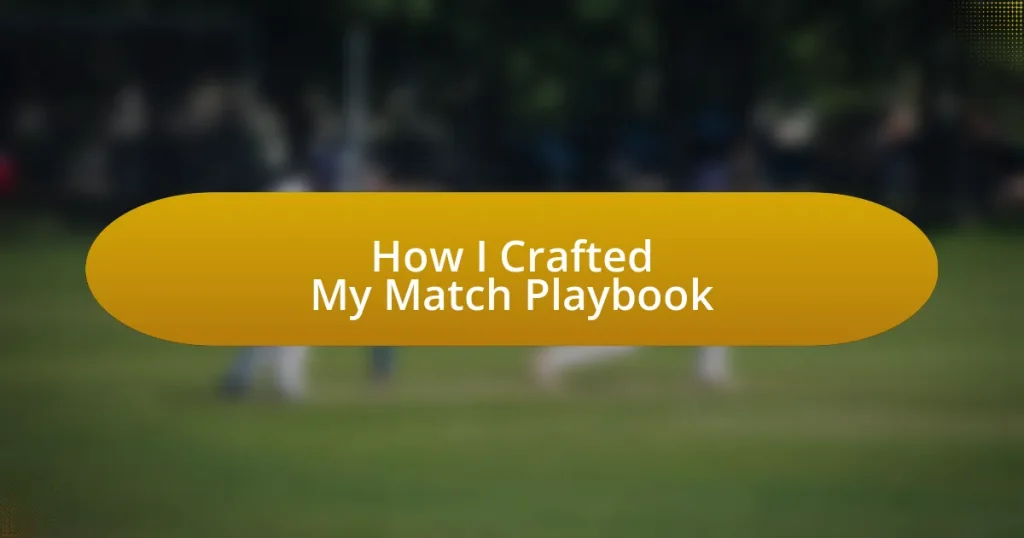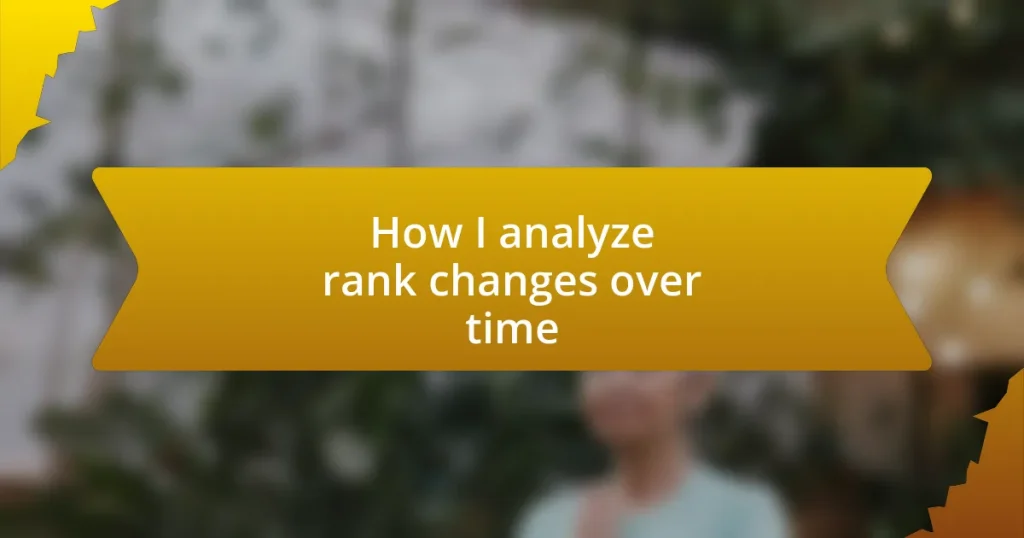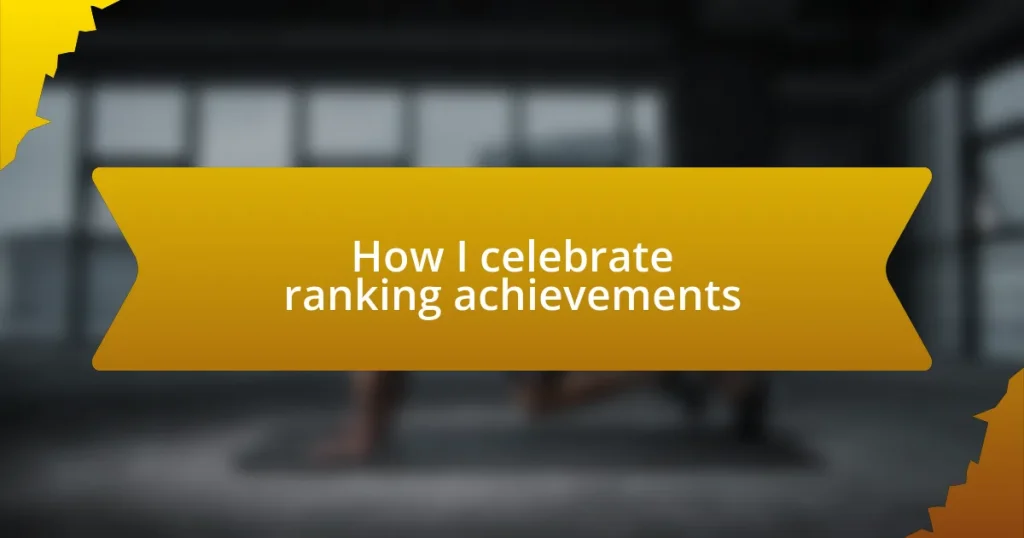Key takeaways:
- Match play emphasizes winning individual holes rather than total score, enhancing strategy and psychological focus.
- Setting nuanced objectives in match play, such as emotional management and tactical goals, contributes to personal growth and performance improvement.
- Analyzing opponents’ strategies, including their strengths and weaknesses, is crucial for adapting one’s own game plan effectively.
- Regularly updating one’s playbook based on experiences and feedback fosters continuous growth and adaptability in competitive play.
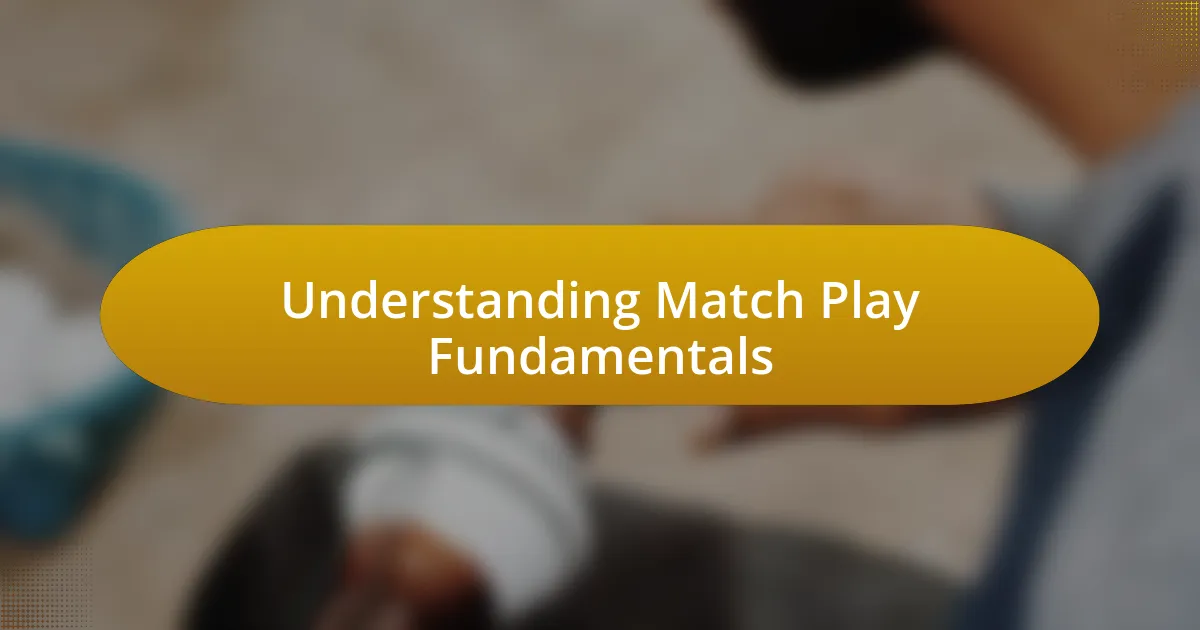
Understanding Match Play Fundamentals
Match play is an exciting format that shifts the focus from total score to winning individual holes. I remember my first experience with match play; every hole felt like a mini-battle, which added an adrenaline rush that I didn’t anticipate. Instead of just adding scores, the constant back-and-forth created a sense of urgency that made each shot matter in a new way.
Understanding the fundamentals requires grasping the strategic mindset involved. For instance, considering whether to play it safe or take risks on a particular hole can be challenging. I once faced an opponent who was excellent at flipping the pressure back to me, prompting me to reflect: should I play defensively or go for the more aggressive approach? It’s moments like these that teach valuable lessons about risk management.
Another key element in match play is the psychological aspect. It’s not just about the swing; your mental game can often determine the outcome. I recall a time when I let my opponent’s confident stance throw me off my rhythm, leading to a few bad holes. Have you ever noticed how much a competitor’s demeanor can influence your own mindset? This experience reinforced that staying calm and focused is just as crucial as physical skill.
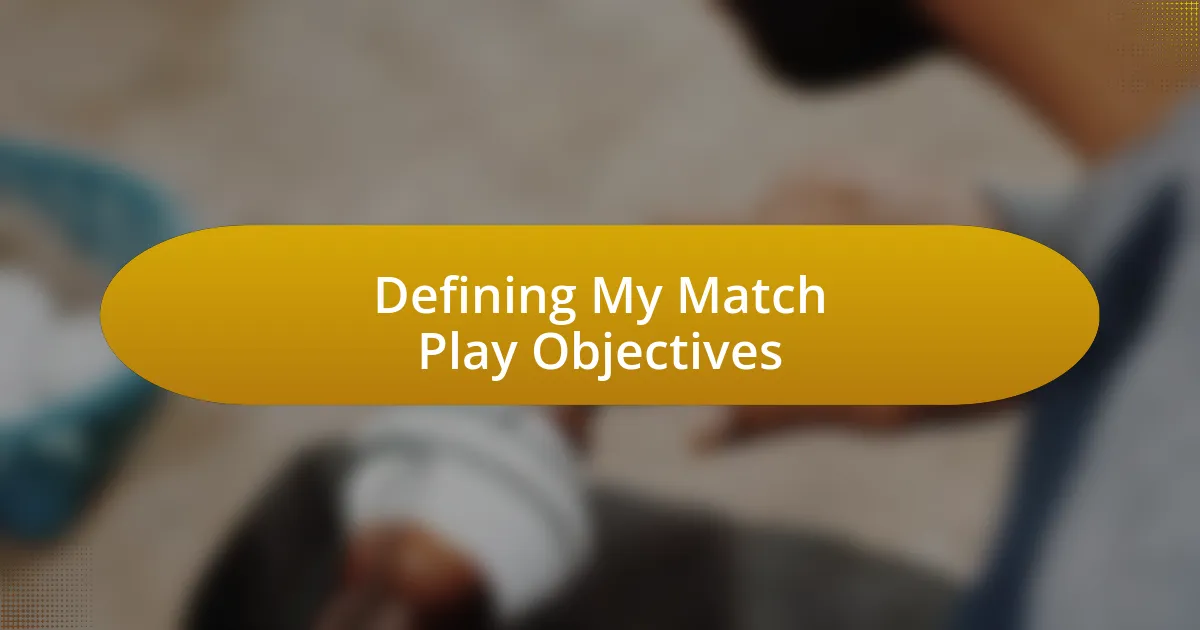
Defining My Match Play Objectives
Defining my match play objectives was a pivotal moment in my journey. Initially, I focused on simply winning, but over time, I realized that setting more nuanced goals could enhance my performance. For instance, I aimed not only to win holes but also to develop my strategic thinking and adaptability during the game. This shift in perspective made my matches feel less like a win-lose equation and more about personal growth.
One of my key objectives was to consistently manage my emotions throughout the match. I vividly remember a game where my frustration bubbled over after missing a crucial putt, which led to a string of poor decisions. From that experience, I learned to recognize my emotional triggers and establish techniques to stay composed. By defining emotional stability as an objective, I noticed a significant improvement in my overall game. Have you ever found that focusing on the mental side of a sport can transform your performance?
Moreover, I made it a point to set specific tactical goals for each match. I began to analyze my opponent’s strengths and weaknesses beforehand. This preparation allowed me to formulate strategies, such as playing aggressively on their weaker holes while maintaining a cautious approach on tougher ones. It’s fascinating how creating a detailed game plan based on each competitor transformed my approach, turning each match into an exciting chess game on the course.
| Objective Type | Description |
|---|---|
| Winning Strategy | Focus on not just winning, but developing strategic thinking. |
| Emotional Management | Recognize emotional triggers and maintain composure during play. |
| Tactical Goals | Analyze opponent strengths and devise a tailored strategy. |

Analyzing Opponent Strategies
Analyzing my opponent’s strategies has become a critical part of my prep work before each match. I’ve learned that understanding their playing style is just as important as honing my own skills. For instance, I once faced an opponent who relied heavily on aggressive drives. Instead of matching that intensity, I chose to focus on accuracy and patience, which turned out to be my winning edge.
To effectively analyze my opponents, I consider several key factors:
- Playing Style: Identifying whether they are aggressive or conservative.
- Strengths: Noting their best skills, such as putting or driving distance.
- Weaknesses: Understanding areas where they struggle and capitalizing on these.
- Psychological Patterns: Recognizing how they react under pressure or after mistakes.
- Course Strategy: Observing their approach to different holes and how they handle challenges.
With these insights, I can better anticipate their moves and adjust my game plan in real-time, transforming each match into a dynamic and strategic encounter.
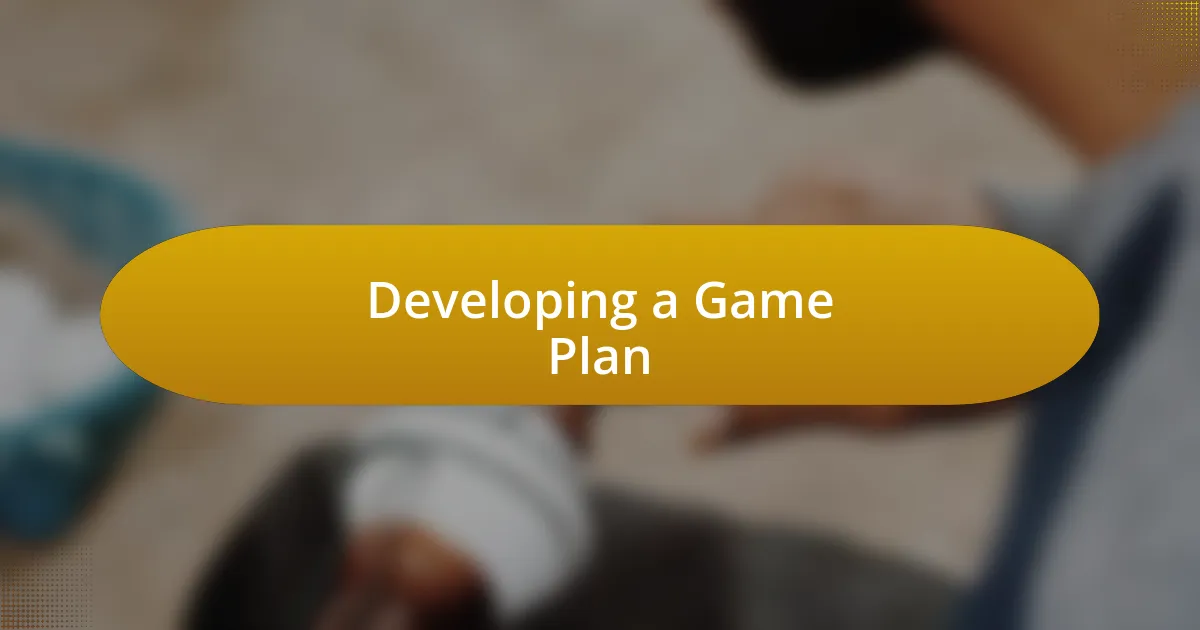
Developing a Game Plan
When developing a game plan, I often find it helpful to visualize the match in my mind before stepping onto the course. For example, I remember one match where I laid out specific targets for each hole based on my opponent’s tendencies. It wasn’t just about hitting the fairway but crafting a strategy that would make them uncomfortable while allowing me to play within my strengths.
An essential part of this game plan process is adapting it as the match unfolds. One time, I started facing an opponent with unexpected finesse around the greens—a skill I hadn’t accounted for. In that moment, I had to pivot my strategy, focusing more on long-range shots and ensuring I maintained a safe distance, which ultimately turned the game back in my favor. Isn’t it fascinating how fluid and adaptive our approaches must be?
When I think about the emotional aspect of game planning, I realize it’s about confidence as much as it is about strategy. Each successful adjustment I make throughout the match adds to my mental fortitude. It’s like assembling a puzzle; each piece of my game plan finds its place as I learn more about my opponent. How do you build your confidence in uncertain situations? Formulating a robust yet flexible game plan can be a powerful first step.
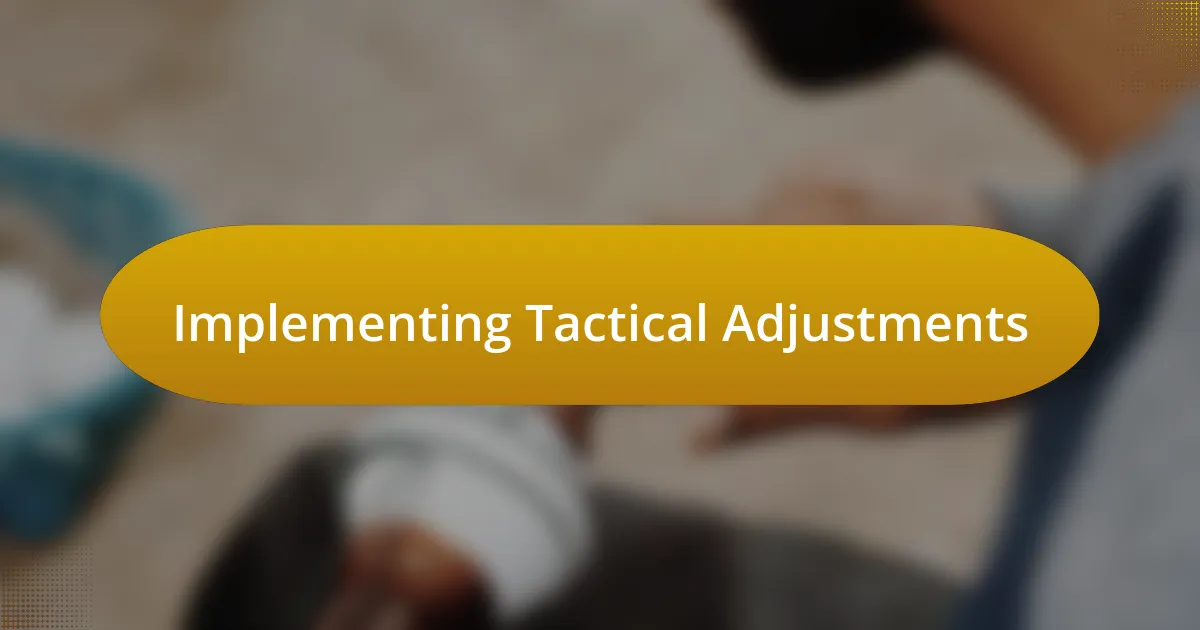
Implementing Tactical Adjustments
Adapting my tactical adjustments during a match is where I truly find the essence of competitive play. There was a day when I realized my strategy needed a complete overhaul mid-match against a surprisingly aggressive opponent. I switched to aggressive tactics, taking risks that would disrupt their flow, and it invigorated my game, showcasing the immediate impact of responding to the evolving dynamics on the course.
What really strikes me is how these adjustments often hinge on reading the moment. I recall a match where my opponent’s confidence waned after a few missed putts. I seized that opportunity to apply pressure, making challenging shots that rattled their composure. Moments like these remind me how much the psychological game intertwines with tactical decisions. Have you ever felt the tide turn simply by being attuned to your opponent’s mind?
It’s not just about adjusting my physical play—my mental game must evolve too. When I implement changes, I often tap into the energy of the crowd. I remember a particularly tense tournament where the audience’s buzz elevated my performance as I shifted strategies seamlessly. In those moments, it feels like I’m not just playing a match; I’m becoming part of a larger narrative, one where each tactical choice weaves into the story of the game. How do you harness the energy around you during critical shifts in play?
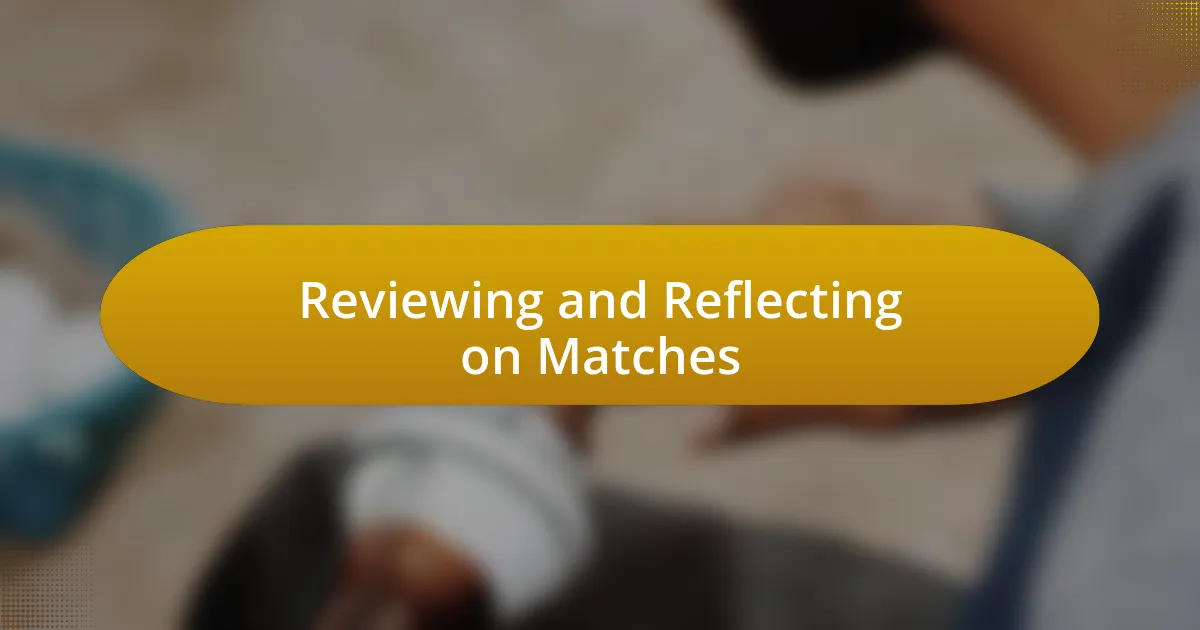
Reviewing and Reflecting on Matches
Reviewing my matches has become an intimate sounding board for understanding my growth as a player. After each game, I take time to dissect not just the moves I made but the emotions I felt. For instance, I remember a match where I was riding a wave of confidence until a crucial mistake derailed my momentum. Reflecting on that moment, I asked myself how I could manage pressure better in the future. It’s a journey of understanding what goes on inside my head while the match unfolds.
The act of review often leads me to surprising insights about my game. There was a time when I realized, during a post-match analysis, that I tended to rush important shots when my energy was low. This understanding not only helped me in later matches but also painted a clearer picture of how fatigue influences my performance. Have you noticed patterns in your play that emerge only upon reflection?
I also appreciate the role of external feedback after matches. Sometimes, my fellow players offer perspectives that I hadn’t considered, providing a fresh lens through which to view my performance. I recall a conversation after a tough loss; a friend mentioned how my strong starts often diminished as I became more focused on results rather than the game itself. That moment was a light-bulb realization for me, reminding me that every match, win or lose, is about continuous learning and refining my approach. How do you integrate feedback into your own growth process as an athlete?

Updating My Playbook Regularly
Updating my playbook is something I consider essential for my growth. Each match brings unique challenges, and I find it vital to tweak my strategies accordingly. After a recent series of tournaments, I noticed that my aggressive style was sometimes leaving me vulnerable. I took the time to reflect and adjust my approach, blending calculated risks with a more defensive tactic when needed. How often do you revisit your strategies to adapt to new circumstances in your play?
I’ve learned that regular updates keep my playbook relevant and responsive. For instance, after a particularly difficult match where I felt overwhelmed, I realized I wasn’t utilizing my strengths effectively. It prompted me to draft specific sections in my playbook that outlined scenarios where I could capitalize on my skills. This practice not only builds my confidence but also equips me to face future challenges head-on. Can you recall a moment when updating your strategies made a decisive difference in a match?
Creating a rhythm around these updates has become a part of my routine. I set aside time after every couple of matches to review my notes and jot down fresh insights. There’s something empowering about witnessing my evolution as a player in real-time. Revisiting and revising my playbook fosters a sense of progress, almost like charting my personal growth story. How does updating your own game plan feel for you?










